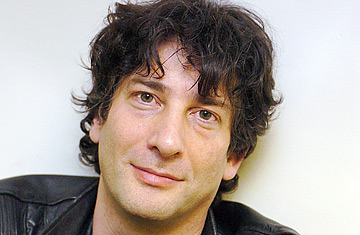
Neil Gaiman circa 2002.
Like all good fairy tales, this one starts with Claudia Schiffer. Once upon a time a fireplace fell on Schiffer's foot. She was pregnant at the time. "When a marble fireplace falls on your foot," Neil Gaiman explains, "and you're 7½ months pregnant, you stop going places. You sit around, and you read." Schiffer read Gaiman's novel Stardust and told her husband that it was the best book she'd ever read. Schiffer's husband is the director Matthew Vaughn (Layer Cake). And thus it was that Gaiman finally made his big Hollywood movie.
It's pretty much time. Gaiman has been an icon in the world of comics and fantasy fandom for almost 20 years. He's notorious for having sold more ideas to Hollywood, without any of them actually getting made, than almost any other living person. Now, all at once, the year of Gaiman is finally upon us. Stardust opens Aug. 10, starring Claire Danes, Michelle Pfeiffer and Robert De Niro. Beowulf, written by Gaiman and directed by Robert Zemeckis, is coming in November. Next year Dakota Fanning will star in Coraline, based on Gaiman's children's book. Is he about to cross over from the weird world of cult fame to the equally weird but more lucrative world of actual, real-world, mainstream fame? "Oh, God," says Gaiman. "I hope not."
Gaiman, 46, certainly looks famous. He's quirkily handsome--he's the hot guy whom the girls never noticed in high school because he was a mathlete--with suspiciously good hair and a black leather jacket. He lives near Minneapolis, but he grew up in Portchester, England. "My biggest problem with Harry Potter is that I went to an English public school and hated it," he says. (By "public school," the English mean what Americans mean by private school.) "I would have rather lived under the stairs." When he was 17, Gaiman wrote his own novel about English schools. "At the end, all the dead teachers came back to life--there was sort of this plague of zombies ripping the thing apart--and our decapitated hero had his eyes pecked out by the school peacock. That for me was trying to write a version of my own public school experience that was nicer and more fun."
Gaiman broke out in 1988 with a comic book about a brooding dream god who haunts humanity's ugly collective unconscious. With its melancholy tone and startling literary intelligence, The Sandman was a landmark in the artistic development of comics, and it won Gaiman the passionate loyalty of a vast army of nerds and goths. Stardust, published 10 years later, is the story of a pleasant young man who crosses into a magical world in pursuit of a fallen star, which he has promised to retrieve for the pretty but rather demanding girl he loves. It's a fairy tale, but it's packed with black humor; one of the movie's highlights is a Greek chorus consisting of the ghosts of seven brothers who murdered one another. Gaiman's writing has the light touch of the English humorist--Douglas Adams is a big influence--but his whimsical charm is a con: what so closely resembles escapism is just a way of re-encountering the sorrows of the real world in transfigured, encoded form.
The fact that Stardust is finally getting made says more about how Hollywood has changed than how Gaiman has. After The Lord of the Rings, Narnia and Harry Potter, not to mention 300, fantasy is a proven commodity. But the big studios may have a more difficult time domesticating Gaiman than they have with his colleagues. Stardust is tough to market--it's a category-breaking mix of comedy, romance, drama and action--and like many truly nerdy genre works, it's full of unhip, unironized emotion. "It's not like a comedy like Shrek that's making fun of the thing," Gaiman says. "It's the thing itself."
It's all fairly win-win for Gaiman. If Stardust becomes the next Princess Bride, then hooray, and if it doesn't, it's back to cult figurehood. "Five years ago, I was absolutely as famous as I wanted to be," he says. "I'm now more famous than I'm comfortable with." In a genre like fantasy, the relationship between artist and fan is a fragile, intimate thing, and in some sense Gaiman is still that nerdy public school kid. He's leery of selling out to the popular crowd. "I have really mixed feelings about the coming Watchmen movie," he says, "because I keep hearing that it's going to be really good. And part of me is going, I don't want a really good Watchmen movie! I want my graphic novel!"
Gaiman's next book doesn't sound as if it will compromise his geek principles any. "It's kind of like The Jungle Book, only instead of a jungle it's a graveyard," he explains. "It's about this 2-year-old whose family is killed, and who is adopted and brought up by dead people and taught all the things that dead people know." And they all die happily ever after.
